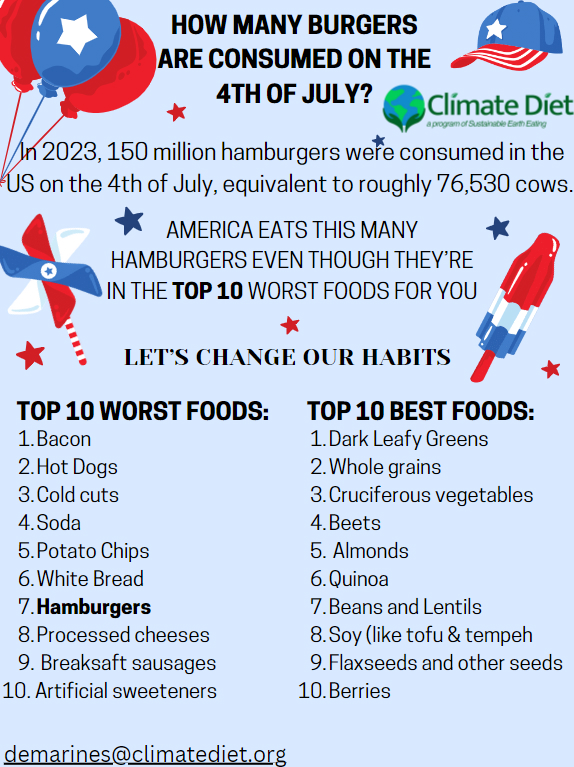
How Many Burgers Are Consumed on July 4th?
Posted on June 28, 2024
U.S. Plans to Eat 76,530 cows this July 4th –147 million burgers!
Washington–6.27.24–Americans like their burgers, but as climate change, clearly and severely affects our living environments via storms destroying highways, coastal towns, and uncontrolled wildfires, with hundreds dying of temperatures reaching 125 degrees F in the middle east, we all must consider solutions.
“Urgent and bold actions are needed, Jane DeMarines, Climate Diet, a nonprofit located in Washington, DC said, “on a global scale to reduce greenhouse gas emissions, transition to sustainable energy sources, and particularly human adoption of diets that currently result in deforestation of major rainforests (Amazon).”
Raising Livestock and their food causes 1/3 of all greenhouse gas emissions.
DeMarines said that creating those burgers, raising livestock and their food causes the loss of carbon sequestering trees, agricultural pollutants such as pesticides, big transportation costs to transfer huge two-ton animals to slaughterhouses are not often included in the climate costs.
These impacts from raising livestock need to be tallied correctly, so people understand the impacts from the enormous meat production, especially in the United States, that no one seems to notice or think about—but when tallied correctly is a massive impact of environmental degradation. (U.S. ranks 1st in meat consumption in the world.)
Changing to alternatives to beef burgers with so many alternatives is not hard, especially considering beef is the most harmful meat to human health from highly saturated fat, and by the far the largest producer of pollution in all food groups. Vegetables and fruits create a tiny fraction of pollution compared to beef production’s greenhouse gases.
Yet change may be forthcoming, as a new consumer survey says nearly 2/3– 60% of consumers are open to meat alternatives. 60% of US Consumers Open to Cultivated Chicken, Beef, & Pork Despite Taste and Health Doubts Survey, Finds Good news for our climate, and our health if we trend in that direction.
